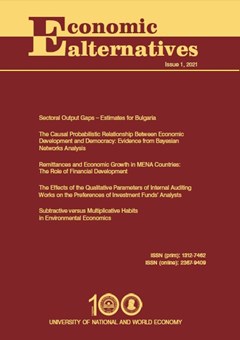The Causal Probabilistic Relationship Between Economic Development and Democracy: Evidence from Bayesian Networks Analysis
Authors: Nedra Baklouti, Younes Boujelbene
Abstract
The present work analyzes the evolution of thinking that drives political scientists and economists vis-a-vis the relationship between a political regime and development. This article addresses the important question of whether democracy promotes economic development and helps to provide a powerful framework for the economic results of autocracy and democracy. Given that relations between democratic transition and economic growth are fairly complex with uncertain results, we used a probabilistic approach based on Bayesian networks, which is an ideal tool for the probabilistic modeling of uncertainty. In fact, the selected sample includes 11 countries1 of the MENA region. We note that Libya has 92.9% of high average incomes and 7.14% of low average incomes; therefore the relationship between democracy and GNI is nonlinear and convex. However, predicting the change of the political regime of scenarios shows that the relationship between the level of income and democracy in Bahrain is non-linear and concave, since its economy is composed of 71.4% of high income and 28.6% of higher average incomes. For the remaining countries, we found that whatever the level of democracy, the income levels remain the same.

